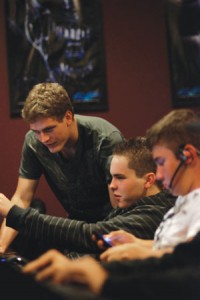The gaming pool hall
by Nicholas Schreiber

Photo by Aaron Chatha. Gamers shed myths about being unsocial creatures by getting together at game centres, for fun play or fierce and professional competitions.
The thought of gaming can conjure up images of anti-social people sitting in the dark glued to a screen, forfeiting interaction in the real world. This may no longer be the case given the rise of a public, and very social, gaming culture. Gamers have the option of playing together online or through an offline, closed network of computers, commonly known as a Local Area Network (LAN).
LAN gaming centres are “the modern day pool hall,” said Shane Chaba, president of SwitchBox Inc, a local LAN centre. “The main reason people come, gamers, is for the social aspect— it is better than sitting in a dark basement,” Chaba said. Tim MacRae, co-owner of The Node, another LAN gaming centre, explained LAN gaming as a “form of social networking”, an in-the-flesh version of Facebook. Why do you go out to restaurants? You have a kitchen at home,” For gamers, this is their fun night out.”
The difference between gaming culture and standard late- night culture is that gamers can choose to be as interactive as they wish, said MacRae, and that a night of gaming might just be a single-player campaign as opposed to the full-blown team- work and headset commitment when playing multi-player. “It is a culture of inclusion, empathy, these things you don’t expect (in gaming), pride, accomplishment and single-mind- ed bloodiness,” said MacRae.
Jonathan Burkinshaw, founder of Calgary-based gaming event group Project X, said gaming is a very diverse culture. Gaming culture also includes professional players and teams who participate in competitions known as e-sports. Burkinshaw, as an events co- ordinator, said, “E-sports, in general, seem to be moving into the next form of Olympics.” This is especially evident by the stadiums used for gaming tournaments in South Korea which match the size of our hockey arenas. “I’m fairly certain these top clan leaders (in gaming) can harness their energies and be good leaders,” said Burkinshaw about professional players.
Burkinshaw recalled two gamers who were given an ultimatum by their girlfriends: choose the video game, or choose the girlfriend. One gamer chose the woman and the other chose the video game. Later, they both said they had made the best decision. Regardless of where gaming happens, when gamers get together in a LAN centre, their competitive nature,lust for caffeine and deep love of video games are all evident.



Thanks Nicholas for taking the time to speak with us in regards to video gaming culture!
Jonathan
Project X
http:www.ProjectxLAN.com